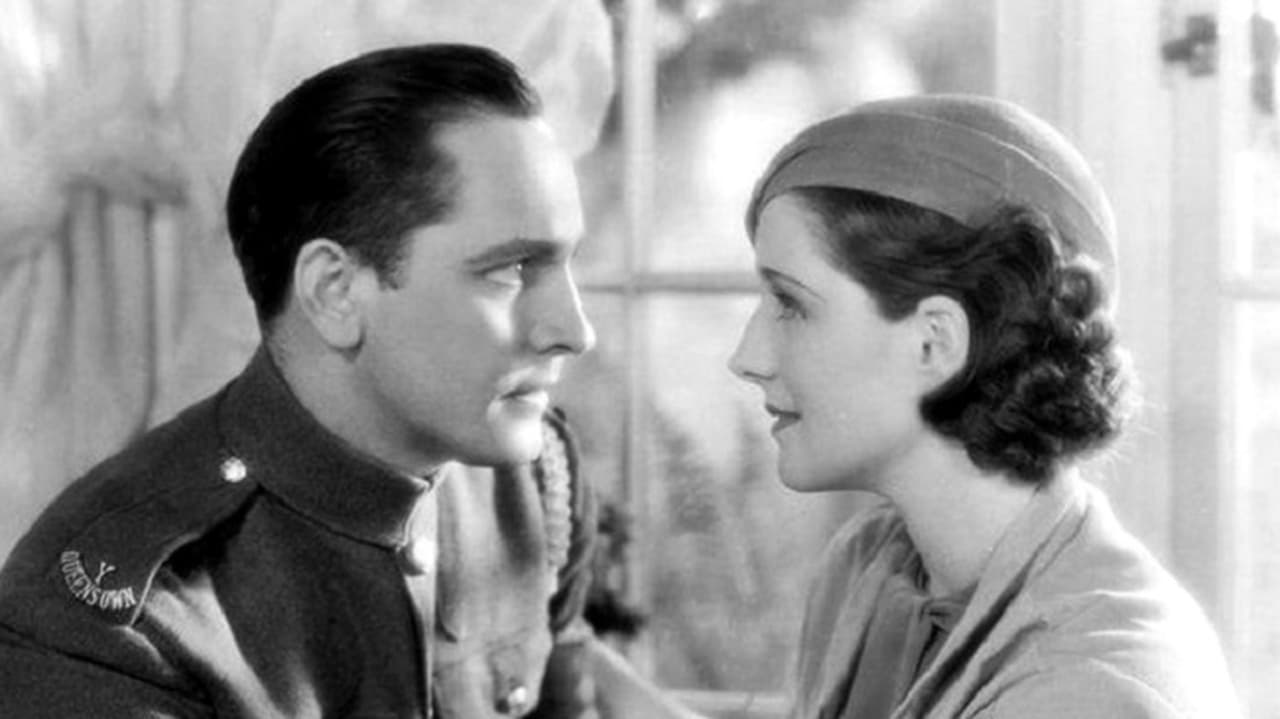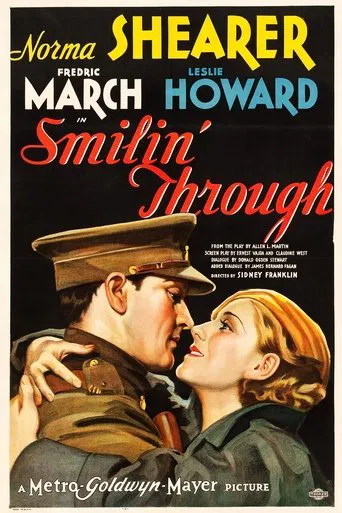

A bit of melodramatic claptrap that works pretty well due to a trio of top-notch actors and a lot of classy MGM production values.Norma Shearer is the orphaned niece who is raised by Leslie Howard. Fredric March is the dashing soldier she falls in love with, but Howard is opposed to the marriage because March's father was responsible for the death of Howard's wife. That wife visits him from time to time as a ghost also played by Shearer. There are a lot of moody scenes set in abandoned houses and lush gardens, and the whole thing has a dreamy atmosphere, enhanced by the blurring of lines between memories of the past and the actual present.As an aside, I'm always fascinated by the treatment of World War I in films from the 1920s and 30s before anyone knew that World War II would come to dominate the cultural discourse later in the century."Smilin' Through" was nominated for a Best Picture Oscar in the 1932-33 award year, a year that saw ten nominees for the top prize. It belongs to a small list of films to receive a Best Picture nomination and no others, something that hasn't happened since 1943 but which is made more possible now that the Academy has gone back to nominating up to ten movies every year.The full list includes: "The Racket" (1927-28); "The Hollywood Revue of 1929" (1928-29); "East Lynne" (1930-31); "Trader Horn" (1930-31); "Grand Hotel" (1931-32, the only film to actually win); "One Hour with You" (1931-32); "The Smiling Lieutenant" (1931-32); "She Done Him Wrong" (1932-33); "Smilin' Through" (1932-33); "Here Comes the Navy" (1934); "The House of Rothschild" (1934); "Ruggles of Red Gap" (1935); "Libeled Lady" (1936); "Grand Illusion" (1938); "One Foot in Heaven" (1941); "The Ox-Bow Incident" (1943).Grade: B
... View MoreI found this film unbearably corny and dated, even for the period. Norma Shearer never impressed me when she played any sort of a period or costume role, as she became too self-aware and phony. Some actresses, Garbo for one, could slip in and out of costume dramas and more modern roles with believability, but not Norma. The only times I found her to be natural were in her early roles as a young actress when she wasn't playing Mrs. Thalberg.This one was just a little too old-fashioned and sentimental for my tastes. I had hoped for more, for a pre-code film.Leslie Howard is generally good in anything he does, and he performs well enough here. But I don't feel a whole lot of chemistry between the pair. And maybe it is the black and white format, but in the portions where Norma is in the blond role, her hair looks more gray than blond, which ages her. I guess I am not a softy...sorry, I don't mean to be harsh, but just did not like this one very much.
... View MoreI saw this film at the Egyptian Theater in Sioux Falls, SD when I was 7 yrs. old. I can still remember the shooting scene. I cried all the way home. I just watched it today and cried all over again! I didn't realize 'til today what a wonderful actress Norma Shearer was. The photography was great, better than I remember 30's movies being. The chemistry between Norma and Frederic was superb. And ,of course, Leslie Howard always gives a stellar performance. I haven't seen the re-makes, but can't imagine that they could improve upon it. I'm saving this movie for my daughter to see so she can appreciate a fine film from the past, one with an everlasting theme and a great story.
... View MoreSir John (Leslie Howard) is devastated and disgusted as his niece Kathleen (Norma Shearer), a young woman living with him since her parents died in her infancy, falls in love with Kenneth (Fredric March), the son of the man who, in a jealous rage, killed Sir John's bride to be on their wedding day. As Kenneth is about to join his company at the front in World War I, Kathleen is torn between her filial duty towards her uncle and her love for Kenneth.Sidney Franklin's film is the quintessential tearjerker, one that I have dreamed of watching all my adult life, and tonight I finally managed. Not many films outlast those sorts of expectations, I found recently that 'Sevent Heaven' was relatively feeble-minded, not the film I had been looking forward to.'Smilin' Through' triumphs though, soaringly so. The film is not only sumptuous in decor and cinematography, but has a real heart and real intelligence. I loved the way that almost every scene takes place in a garden with burgeoning flora, drooping flowers, heavy with romantic regret and sexual portent. One could almost smell the dizzy perfume of the plants. And I admired the way that Sidney Franklin distinguishes so clearly and yet not demonstratively between the way that young love professes itself in the 1860's, the time of John's and Moonyeen's courtship, and the war years with Kathleen's and Ken's romance. Franklin, in his direction, subtly underlines the tender dewy-eyed romanticism of the old days, "misty, water-colored mem'ries" indeed, with Kathleen perpetually wearing her wedding gown, even in her scenes as a ghost. And in the modern story we have an altogether more practical couple, acting in the context of a world war, with the far-away guns and canons sending rumblings through the village, sending windows and panes rattling. Kathleen in the modern story is more earthy and doesn't, in this pre-Code Hollywood picture, disguise how she is longing for her sexual union with Ken: "By the time I'm through with you, you won't be able to fight anyway", she claims.The acting is a chapter unto itself. I was never a fan of Leslie Howard's, and although it must be said that his part is probably the least interesting in the film, he conveys an endearing boyishness in the 1860's scenes, easy-going and infectious. Fredric March strikes up a marvelous rapport with Norma Shearer, sending off sparks of a loose energy that seem almost improvised, certainly captivating. Their scenes today should even today serve as must-see footage for acting students. March shows glimpses of the impressive character actor he was to become, and Shearer is luminous and entirely lovable, great performances.The perfect genre piece, destined to give you the most delicious heartache.
... View More